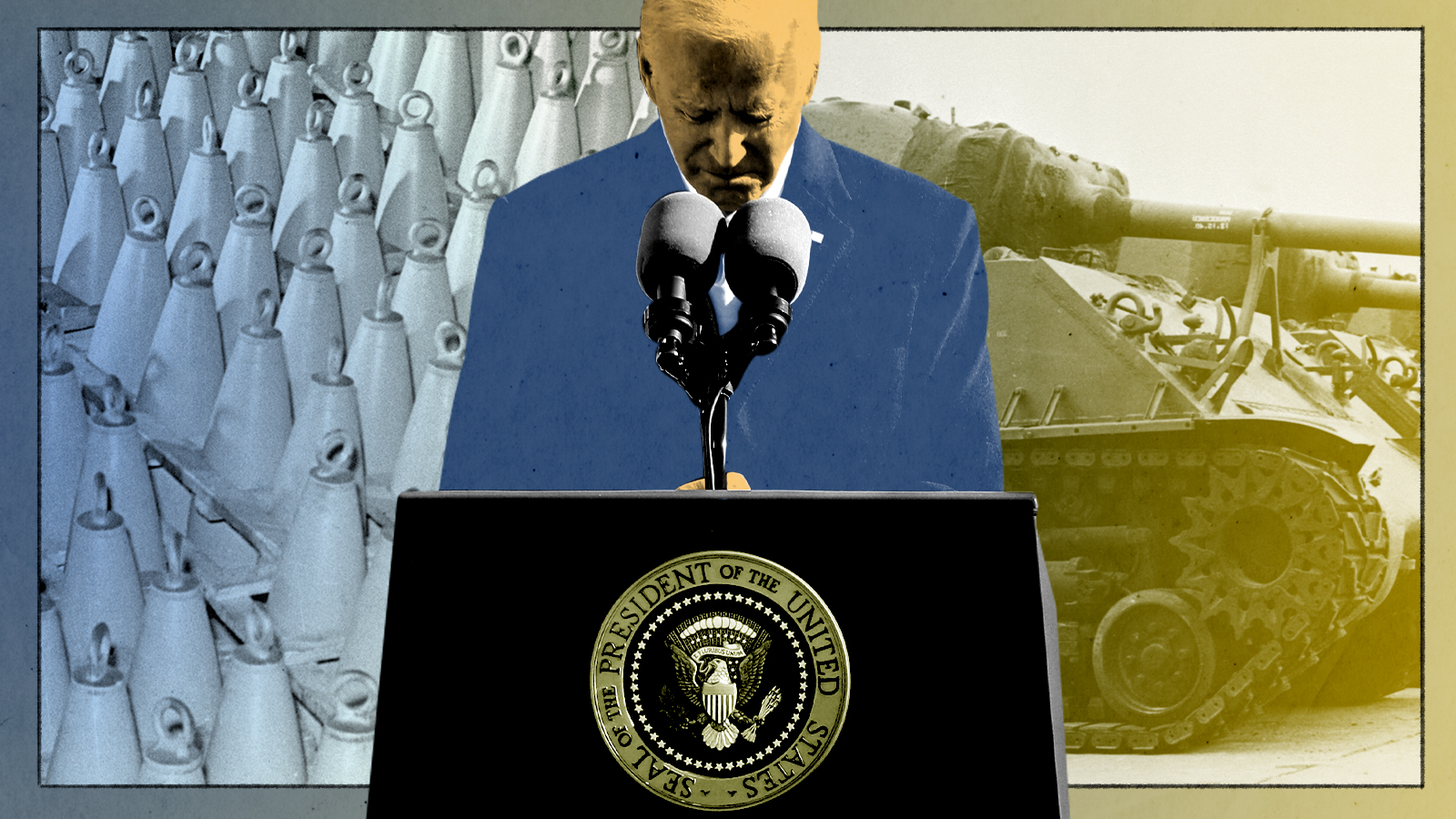Is the West sending enough weapons to Ukraine?
The sharpest opinions on the debate from around the web


A free daily email with the biggest news stories of the day – and the best features from TheWeek.com
You are now subscribed
Your newsletter sign-up was successful
President Biden on Thursday asked Congress for another $33 billion for Ukraine, including $20 billion in new military and security assistance, the biggest funding request since Russia invaded on Feb. 24. Russia has warned the United States and its allies against sending Ukraine more weapons. Russia's ambassador to the U.S. said arms deliveries were "pouring oil on the flames."
The latest $800 million package includes 72 155mm howitzers, powerful guns that can blast 90-pound shells 25 miles. The U.S. also is sending 144,000 artillery rounds, and 121 new Phoenix Ghost drones, which explode on contact after following their targets for up to six hours. A packaged announced a week earlier included 300 Switchblade drones, 200 armored personnel carriers, 18 155mm howitzers, and 11 Soviet-designed Mi-17 helicopters.
The question is, with Russia intensifying bombardments across Ukraine as it conducts a new offensive that could carve off much of eastern Ukraine, will this surge of arms be enough?
The Week
Escape your echo chamber. Get the facts behind the news, plus analysis from multiple perspectives.

Sign up for The Week's Free Newsletters
From our morning news briefing to a weekly Good News Newsletter, get the best of The Week delivered directly to your inbox.
From our morning news briefing to a weekly Good News Newsletter, get the best of The Week delivered directly to your inbox.
1. Finally, Washington is giving Ukraine what it needs
The commitment to send howitzers and other heavy weapons is a sign of Ukraine's growing success, says Max Boot in The Washington Post. "In the beginning, the West was sending handheld weapons such as Stinger antiaircraft missiles and Javelin and NLAW antitank missiles, designed for a guerrilla resistance against a Russian occupation." Now we're finally sending in the big guns. "These are weapons designed to win the war, not prolong it."
"Better late than ever," says Marc Thiessen, also in The Washington Post. "It took two months and thousands of unnecessary civilian deaths," but Biden is now "providing Ukraine with the weapons it needs." Now that the Biden administration has stopped fretting about provoking the Kremlin and gotten fully behind Ukraine's war effort, it wants more than just a Ukrainian victory. It intends to "help Ukraine so decimate Russia's military that it can no longer threaten its neighbors."
2. What the U.S. has committed so far isn't enough
U.S. and NATO aid to Ukraine "has been too little, too late," says former assistant defense secretary and combat Marine Bing West in The Wall Street Journal. Biden conceded the air war to Russia a month ago when, "unnerved" by Putin's threats, he "vetoed the transfer of Polish MiGs to Ukraine." And 90 artillery pieces with 144,000 shells won't last long enough to turn around the ground war. In its peak 1995 bombardments of Grozny, Chechnya's capital, Russia fired an estimated 4,000 rounds — every hour.
Sophisticated drones and 155mm artillery have proven effective on the battlefield, says Alex Gatopoulos at Aljazeera, and "Ukraine has clearly demonstrated it can use whatever weapons it has to great effect." But Ukraine's "air force has been reduced and is exhausted. For the coming battles to be decisive for Ukraine, it will need airpower and that is the one thing the West has repeatedly refused to provide, fearing a wider conflict that draws in NATO."
A free daily email with the biggest news stories of the day – and the best features from TheWeek.com
3. At least Ukraine now has a fighting chance
The new wave of heavy weapons will help, say Christopher Miller and Paul McLeary at Politico, "but it may be too late for the Ukrainian troops who have fought for weeks in brutal house-to-house combat in Mariupol" against Russians armed with tanks, rocket artillery, and armed infantry vehicles. With reinforcements and heavy weaponry, other Ukrainian forces in the east could avoid falling into the same desperate position as the Ukrainians now making their last stand in Mariupol's besieged steel plant.
Just getting these weapons was a victory for Ukraine, says The Associated Press. "The longer Ukraine's army fends off the invading Russians, the more it absorbs the advantages of Western weaponry and training — exactly the transformation President Vladimir Putin wanted to prevent by invading in the first place." "But what does Ukraine 'winning' and a 'weakened Russia' look like?" says Michael A. Cohen at The New Republic. Will Russia leave Ukraine, including Crimea, which Moscow annexed in 2014? Unlikely. The aid could prolong the conflict, and that will bring "potential dangers" we can't foresee.
Harold Maass is a contributing editor at The Week. He has been writing for The Week since the 2001 debut of the U.S. print edition and served as editor of TheWeek.com when it launched in 2008. Harold started his career as a newspaper reporter in South Florida and Haiti. He has previously worked for a variety of news outlets, including The Miami Herald, ABC News and Fox News, and for several years wrote a daily roundup of financial news for The Week and Yahoo Finance.
